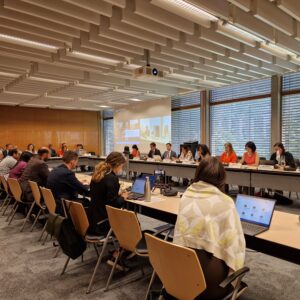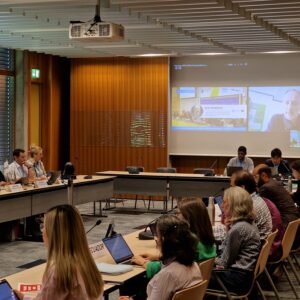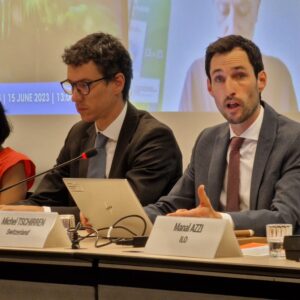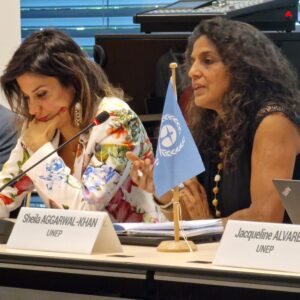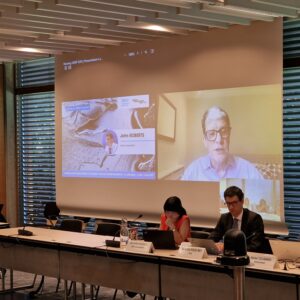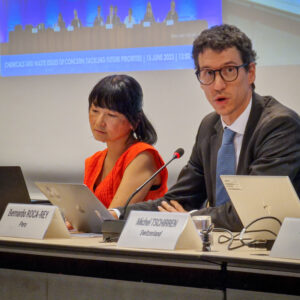Event Conference
Chemicals and Waste Issues of Concern: Tackling Future Priorities

15 Jun 2023
13:00–14:30
Venue: International Environment House II & Online
Organization: UNEP Chemicals and Health Branch, Geneva Environment Network
Following the UN Environment Assembly (UNEA) resolution 5/7, UNEP is conducting a consultation process on issues of concern, posing risks to human health and the environment. This event, organized within the framework of the Geneva Environment Network, discussed priorities of further work, building on existing measures and initiatives, and further potential international action.
About the Event
At the fifth session of the UN Environment Assembly (UNEA-5), Resolution 5/7 requested the Executive Director of the United Nations Environment Programme to seek views from Member States and other stakeholders on priorities for further work, building on existing measures and initiatives, and on potential further international action on the issues discussed in the Assessment Report on Issues of Concern. The resolution also requests for the preparation of a summary analysis, taking into account the views received.
The United Nations Environment Programme is conducting a consultation process on issues of concern, posing risks to human health and the environment. In this context, this event was convened to discuss priorities of further work and further potential international action.
There are 19 issues of concern that pose risks to human health and the environment, 11 of which are issues with emerging evidence of risks identified by the Global Chemicals Outlook II. The other 8 are emerging policy issues and other issues of concern identified under the Strategic Approach to International Chemicals Management.
- Chemicals in products| Endocrine disrupting chemicals (EDC); Phthalates; Bisphenol A (BPA); Microplastics; Chemicals in products; Hazardous substances in the life cycle of electrical and electronic products (HSLEEP); Polycyclic Aromatic Hydrocarbons (PAHs); Nanotechnology and Manufactured Nanomaterials and Per- and polyfluoroalkyl substances (PFASs) and the transition to safer alternative.
- Metals & metalloids | Lead; Lead in paint; Cadmium; Arsenic; Organotins
- Bio-active substances | Highly hazardous pesticides (HHPs); Glyphosate; Neonicotinoids; Triclosan and Environmentally persistent pharmaceutical pollutants (EPPPs).
Speakers
By order of intervention.

Sheila AGGARWAL-KHAN
Director, Industry and Economy Division, UN Environment Programme

Michel TSCHIRREN
Waste and Chemicals Focal Point, Federal Office for the Environment, Switzerland

Ludovic BERNAUDAT
Head of Knowledge and Risk Unit, UN Environment Programme

Bob DIDERICH
Head of Division, Environment Directorate, Organisation for Economic Cooperation and Development

Vuttichai KAEWKRAJANG
Director, Hazardous Substances Sub-division, Waste and Hazardous Substances Management Division, Pollution Control Department, Thailand

Melissa WANG
Senior Scientist, Greenpeace International and Honorary University Fellow, University of Exeter
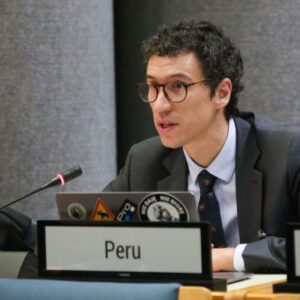
Bernardo ROCA-REY
Minister-Counsellor, Permanent Mission of Peru to the international organizations in Geneva | Responsible for Health & Environment

Juergen HELBIG
International Chemicals Policy Coordinator, Safe and Sustainable Chemicals Unit, DG Environment, European Commission

Kei OHNO WOODALL
Senior Programme Management Officer, Basel, Rotterdam and Stockholm Conventions Secretariat

Ahmad ANSARI
Partnerships Director, The ZDHC Foundation
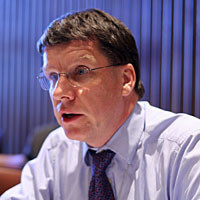
John ROBERTS
Senior Consultant

Manal AZZI
Team Lead on Occupational Safety and Health, International Labour Organization | Moderator
Summary
Opening
Manal AZZI | Team Lead on Occupational Safety and Health, International Labour Organization | Moderator
Issues of concern are relevant to all stakeholders, in particular to those most exposed to them, such as workers. In the context of the International Labour Organization, discussions are taking place around the importance of the safety and health of workers in all sectors, for which realization the addressing of issues of concern is fundamental.
Sheila AGGARWAL-KHAN | Director, Industry and Economy Division, UN Environment Programme
- The UN Environment Assembly (UNEA) put forward a resolution (UNEP/EA.4/Res.8) on issues of concern while it was in the broader context of chemicals and waste management.
- The resolution asked to look at priorities and issues of concern that have been identified in the Strategic Approach to International Chemicals Management (SAICM) and from the Global Chemicals Outlook (GCO). The aim is to understand what advances have been made on these issues and whether the broader International Community can address these issues.
- Two weeks ago, UNEP launched a report on chemicals in plastics at the Second Session of the Intergovernmental Negotiating Committee on Plastic Pollution (INC-2) in Paris.
- The wealth of information contained in the report can be a foundation for some of the work that will take place in this Issues of Concern process.
- During the 2023 meeting of the Conferences of the Parties to the Basel, Rotterdam and Stockholm Conventions, some of the chemicals issue also in Plastics identified some of the additives that have been highlighted as a priority issue to be dealt with.
- These are chemicals in products, endocrine-disrupting substances, heavy metals from lead to cadmium, microplastics, PFAs.
- Many of these have already gotten a lot of attention and have already been identified as an issue of priority but require further work to be tackled. The chemicals international community is vast and it is fundamental to have an overview of positions on what further action must be prioritized and further work is needed.
- That will allow us to present Member States with a proposal on the next steps.
Michel TSCHIRREN | Waste and Chemicals Focal Point, Federal Office for the Environment, Switzerland
- Switzerland, together with Peru and Thailand, tabled a draft resolution at UNEA-5 that led to the adoption of resolution 5/7 on the sound management of chemicals and waste. In turn, the resolution triggered this consultation process on further action on issues of concern.
- So far, the consultation process is offering good insights to prepare for UNEA-6 and other processes.
- UNEP’s Assessment Report on Issues of Concern report demonstrated that there are many pressing challenges the International Community faces and needs to address. For many of these, the international governance frameworks require further development.
- The Beyond 2020 instrument to be adopted soon, conferences of parties of multilateral environment agreements (MEAs), and the development of new treaties are good opportunities to address issues of concern and further progress by building on existing structures and networks.
- Geneva is a perfect setting for interinstitutional actors’ collaboration. With UNEP’s chemical branch, ILO, the World Health Organization, the World Trade Organization, among others and member states missions in Geneva, close collaboration on these issues is possible.
- One of the main priorities the process should consider is addressing problematic substances in groups.
- As stated In UNEP’s chemicals in plastics report, current action is insufficient, but we have opportunities to group the issues and if we expand existing instruments.
- Heavy metals, cadmium, lead, and arsenic are an area where such grouping of chemicals would be particularly instrumental.
- The Minamata Convention is a good model, as it considers a life cycle approach.
- We think that addressing them as a group based on existing and well-functioning governance mechanism is a way forward to consider.
Overview of Consultation Process | Chemicals and Waste Issues of Concern
Ludovic BERNAUDAT | Head of Knowledge and Risk Unit, UN Environment Programme
- UNEP developed the Global Chemical Outlook (GCO) over the years.
- The first report published in 2013 highlighted chemical intensification. The second report or an update of the report informed UNEA and the intersessional process, considering the strategic approach to international chemicals management Beyond 2020 (SAICM).
- The GCO highlights ten key findings, concluding that while many chemicals are important for sustainable development, trends cause major concerns.
- The global goal to minimize adverse impacts on chemicals and waste was achieved by 2020, but solutions exist if high ambition from all stakeholders globally is committed.
Key findings:
- In spite of billions of dollars invested annually in the progress of international treaties and voluntary instruments, however, commitment has been uneven.
- Significant resources can be saved by sharing knowledge on chemical management more widely and by enhancing mutual acceptance of approaches in areas ranging from chemicals as assessment to alternative assessment.
- The global knowledge gap can be filled through better collaboration.
Chemicals management in UNEA
- UNEA Resolution 4/8 mandated UNEP to follow trends in the design, production, use, and release of chemicals and the generation of waste in order to identify issues of concern for future editions of the GCO and the Global Waste Management Outlook and catalyzed sound management actions.

- This report was published in September 2020 with the issues of concern from the assessment report that originated from GCO2 and SAICM.
- The report reviews our current regulatory and policy framework addresses the 19 issues of concerns through specific instruments and actions.
- GCO2 identified 11 issue with emerging evidence of risk , the report further assesses current exposure and provide background information on environment or human health effects of these.
- Issues identified by GCO2 have linkages with the issues identified by SAICM, showing that addressing either contributes positively to the other.
- At UNEA-5, resolution 5.7 requested UNEP to seek views from member states and other stakeholders, while ensuring sufficient time for their consideration on priorities for future work, building on existing measures and initiatives, and on potential International action on the issues discussed in the assessment report of issues of concern issued in September 2020 and in particular for those issues identified in the GCO2.
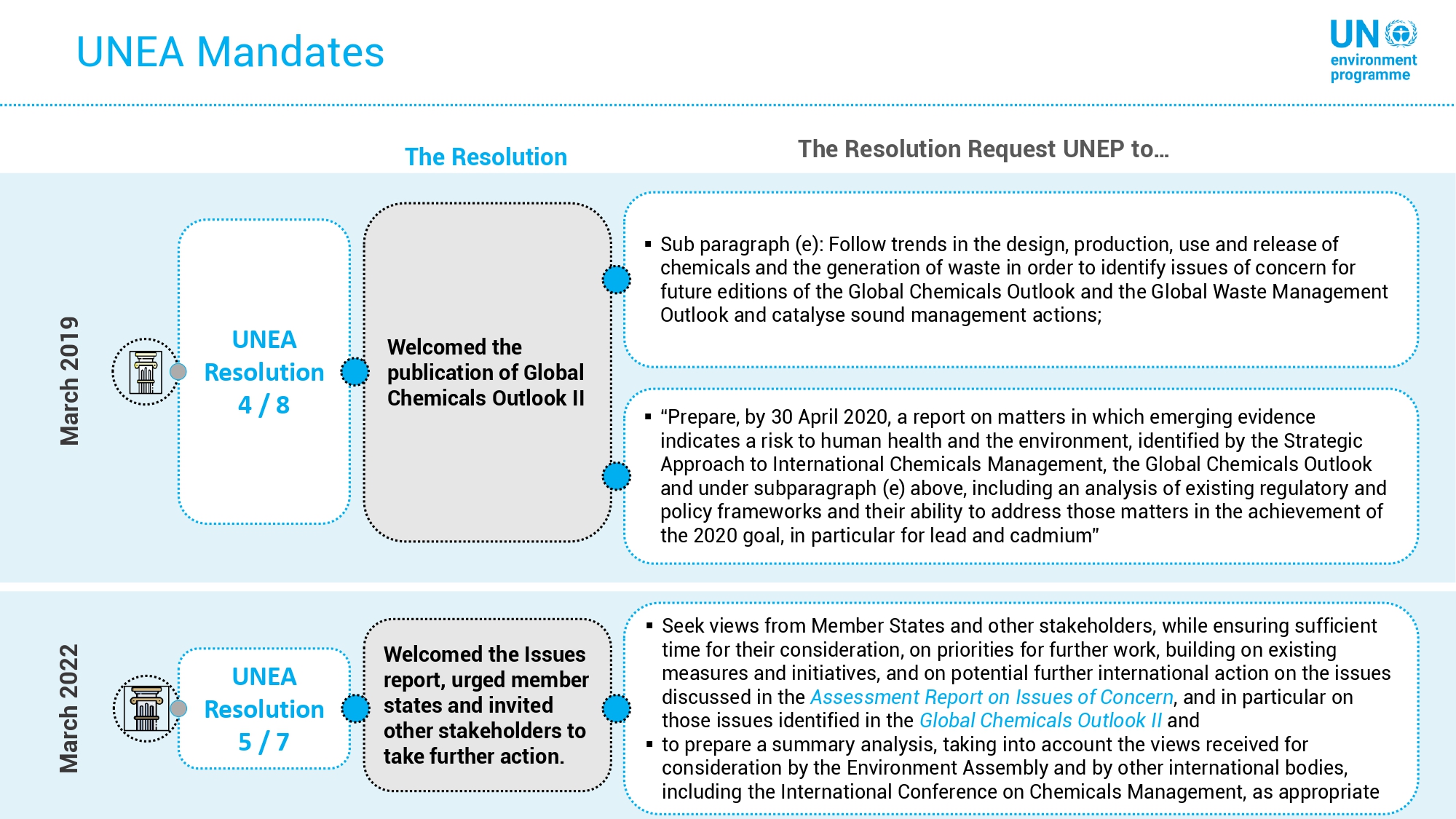
Consultation process to address UNEA resolution 5.7

- Information sharing webinar | Overview of findings from the Assessment Report on Issues of Concern | 27 April 2023
- The form for submitting written inputs will remain open until 26/07/2023, COB. More information is available on the survey form.
- Global Consultation on Issues of Concern – Geneva meeting | 11-12 July 2023
Issues of Concern
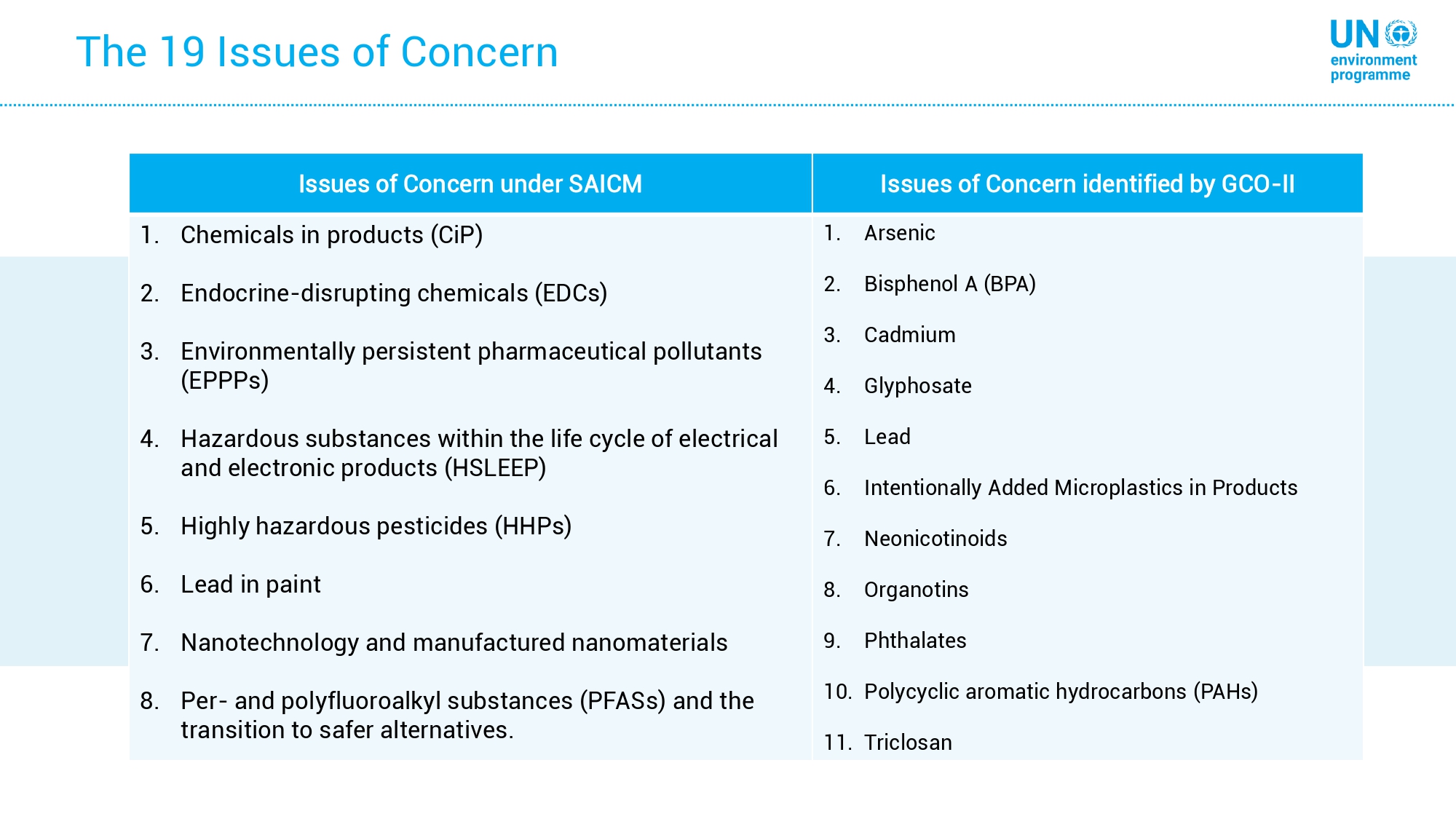
- It is unlikely to deal with these 19 issues of concern at once. We need to find ways to link, prioritize them and identify their different priorities.
- Their effective addressing depends also on the partners that will help tackle these and reduce the impact of chemicals and waste on the Environment.
Panel I – Prioritizing Issues of Concern: Which of these are critical to address now?
Bob DIDERICH | Head of Division, Environment Directorate, Organisation for Economic Cooperation and Development
- Prioritizing across priorities is not easy or if not impossible. National and international action is already advancing on various issues and progress is parallel.
- The OECD, for instance, is developing methods to test for the safety of nano-materials or to identify endocrine disruptors or alternatives to PFAs.
- We need to develop international government frameworks. One of the lessons learned from working on the emerging policy issues for SAICM is that, in the absence of such frameworks, the prerequisite and priority for working issues of concern is for countries to have chemicals management systems in place to implement risk management measures.
- These entail a legislative basis to implement risk management measures for chemicals.
- The economic impact of inaction for chemicals like lead is very well established. Authorities dispose of all information needed to implement risk reduction measures.
- The role of the International Community in the absence of international frameworks or treaties is to ensure that the post-2020 framework for the sound management of chemicals, the successor of SAICM.
- Sharing existing national risk assessments for these priority chemicals for other countries to adopt to the national contexts is key.
- We can continue and expand the work on the burden of disease and the economic impact of those priority chemicals that do exist, as in the case of lead. Developing those burden of disease figures, both in terms of actual health effects as well as economic impacts, will really help countries to act on individual chemicals and incentivize them to set up their general chemicals management system.
- The OECD is currently building some tools to better estimate the economic impact of chemicals that are a risk to human health and to the environment.
- For chemicals in products, an international standard to transmit information on the content of chemicals in articles in the supply or value chain is needed for users or actors to eliminate them.
- The exposure pattern of some of these chemicals has changed over the last few years because of risk reduction measures in some countries. For example, for lead the main exposure has shifted away from lead in paints towards other uses. It would make sense to develop updated fact sheets on the most relevant exposure pathways.
Vuttichai KAEWKRAJANG | Director, Hazardous Substances Sub-division, Waste and Hazardous Substances Management Division, Pollution Control Department, Thailand
- Thailand is one of the co-sponsors of the resolution on sound management of chemicals and waste for prioritizing issues of concern.
- Thailand is focused on chemicals in products, and hazardous substances in the life cycle of electrical and electronic products (HSLEEP), among others
- Chemicals in products represent a chemical management issue. If addressed in the design, products containing less and less hazardous chemicals can be part of a circular economy; facilitate Extended Producer Responsibility (EPR) and public-private partnership.
The BCG Model
- The Bio-Circular-Green Economy (BCG) model developed by Thailand is a strategy for National Development and post-pandemic recovery.
- The BCG model places emphasis on applying science, technology and innovation to turn Thailand’s comparative advantage in biological and cultural diversity into a competitive advantage, focusing on four strategic sectors, namely 1) agriculture and food, 2) wellness and medicine, 3) energy, materials and biochemicals, and 4) tourism and creative economy.
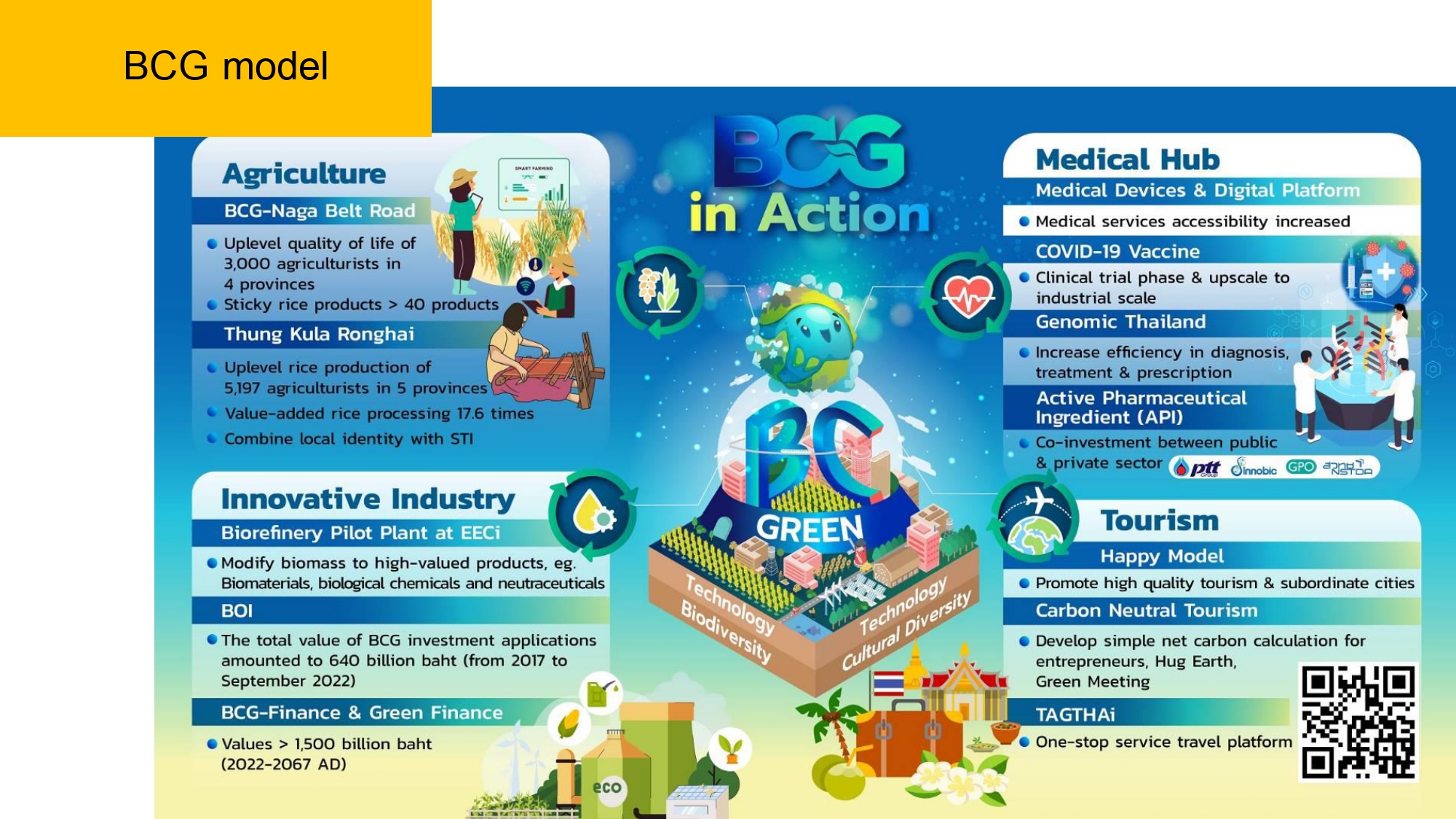
- Thailand enforced a ban on municipal waste and on 478 types of electronic waste, establishing an ad-hoc office to monitor these while local administrations are in charge of organizing the collection, recycling and disposal of waste in Thailand.
- E-waste continues affecting human health, making increased awareness an urgent necessity. As this challenge is common to many countries, we need international governance and regulations on these aspects.
- To further enhance circularity, Thailand announced it will prohibit plastic imports starting from January 2025. This shall support domestic plastic circularity both in terms of quality and quantity.
- Thailand’s Second National Plastic Waste Management Action Plan (2022-2027) focuses on minimizing the leaks of hazardous waste in the community area and introducing EPR systems to industry and recycling packaging.
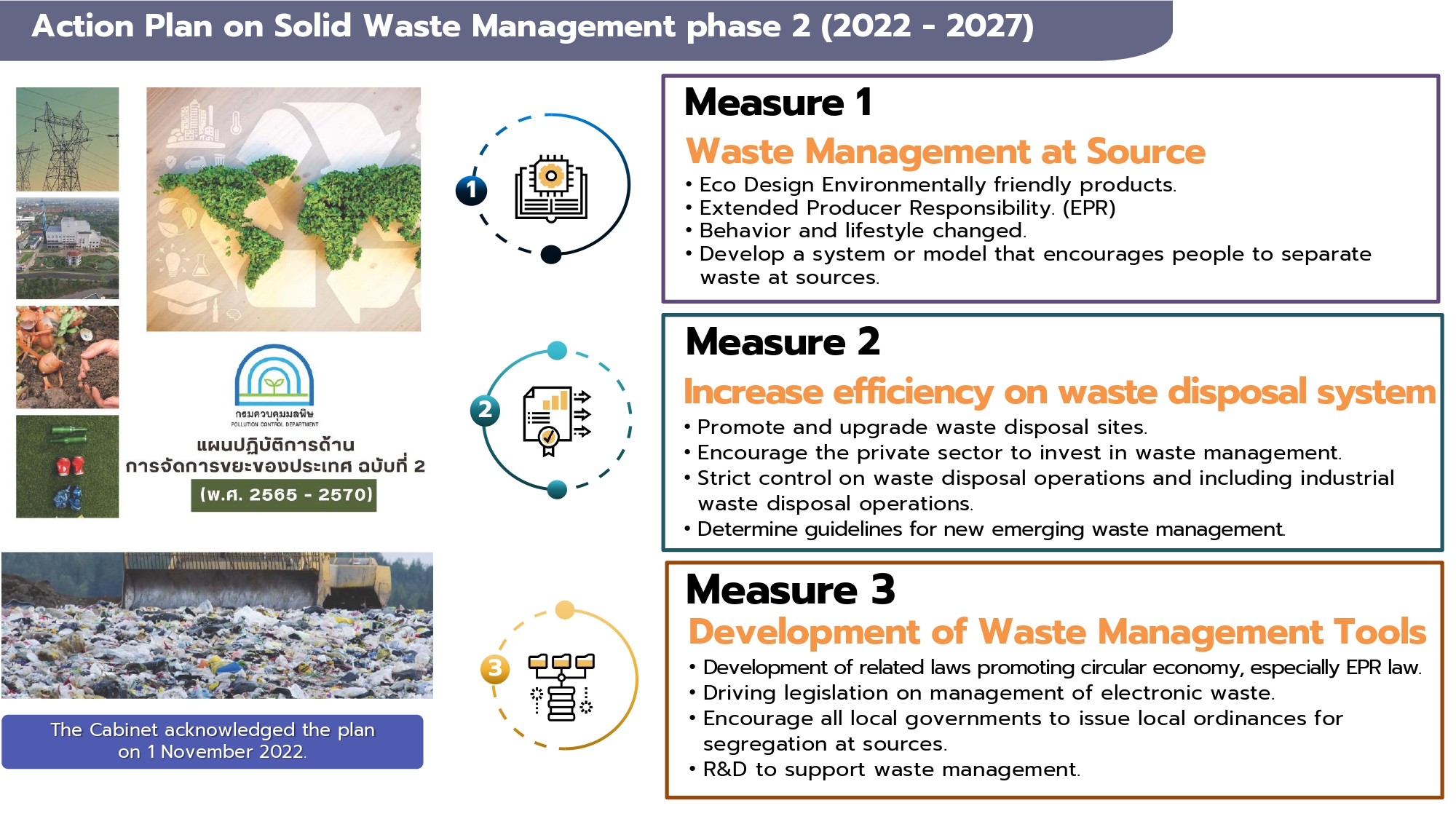
Melissa WANG | Senior Scientist, Greenpeace International and Honorary University Fellow, University of Exeter
- The reason why talking about issues of concern is relevant is captured by UNEA resolution 4/8, stressing how the substantial growth in chemicals and the generation of waste represents a threat.
- Issues of concern are also linked and of cross-cutting relevance to other environmental and sustainability challenges, demonstrating the urgency to address them more effectively.
- Some of the issues of concern have been proposed under the assumption that once they are properly addressed, the urgent challenges of chemical and waste and their socio-economic and environment externalities will be addressed accordingly.
- To assess the truthfulness of this assumption, three points must be kept in mind:
- The development of market technology and knowledge is very dynamic. Our responses must be agile and responsive to a living process. For instance, microplastics are one of the listed chemicals of concern, but chemicals in plastics are not, making the identification of these, their position within value chains, and the prevention of their negative impacts a missing point.
The horizon-scanning function of the science-policy platform under negotiation could provide an important role to respond to the dynamic nature of development and help suggest criteria for listing and action on new issues of concern. - Prioritization must be specific on the subjects and objectives. Listed issues are at different stages in terms of knowledge, action and research. Although further research is necessary, sufficient data can be already used to leverage action, which in turn must be specific on whether it should focus on research, fundraising, reduction, remediation, or compensation.
- Action and resource allocation to address issues of concern should be guided by the waste hierarchy. In reality, resource allocation follows a reversed waste hierarchy. Such a gap is the fundamental reason for a lot of the criticism of greenwashing the burden-shifting and stuck negotiations. We should reduce the pace of material flux by extending the use phase, facilitating a system with a good business model relying on reuse, and making products that last longer. In this way, we can slow the material loop. At the same time, we also must avoid these hazardous substances in the first place to facilitate a safe circular economy to close the loop.
- There are lot of opportunities for collaboration and a science-policy platform can provide a lot of growing net.
- What is most urgently needed is commitment, ambition, and global action under all existing and planned mechanisms by all IOMC organizations, member states, and stakeholders. Collaboration should operate in a well-coordinated and orchestrated way, adopting for example the grouping and life cycle approach, action to slow and close the material loop action, and resource allocation advertise upstream guided by the waste hierarchy.
Panel Discussion
Sheila AGGARWAL-KHAN: Many of the countries UNEP is consulting with struuggle with having the financing for a sound chemical management system. How would you see the domestic financing needs to just sustain recurrent costs for basic chemicals management capacity to go into effect?
Bob DIDERICH: It is dependent on the level of ambition a country wishes to achieve and how much it is willing to rely on what other countries have already done. A minimalist system can be envisaged and must cover a legislative authority to whom direct questions on chemicals; which is able to perform risk assessments; and implement risk management measures for priority chemicals. That allows to address priority chemicals that have been listed. In terms of finances, a minimalist system should be affordable for most countries.
Q: Global problems need to be addressed globally. How do we make sure improved and broader participation, while informing all actors, on cross-cutting issues such as environmental chemical pollutants from pharmaceuticals, for instance?
Melissa WANG: As during the years much more funding has been devoted to biodiversity and climate change, involving more stakeholders and especially getting more scientists on board can become harder. The negotiated science-policy platform should not only provide the support and resources for the current generation of scientists but also develop the capacity building for them to be involved in the process. This can send a powerful signal and guarantee the next generation of scientists will be eager to contribute to this area.
Q: How can one prioritize when everything seems to have different solutions and at different levels and depends on national circumstances?
Melissa WANG: The science-policy platform could play an important role in helping suggest the criteria for prioritization. This needs collective efforts, not only from scientists but also policymakers and stakeholders who know the local and global contexts, to co-create global criteria for both listings of chemical issues of concern for prioritizing actions.
Q: Many countries do have legislation in place but struggle with implementation capacity and oversight. Chemical management systems worldwide are struggling to address the large number of chemicals already entering the market and the changes in chemical production and uses. Can further implementation of the current chemical management system, especially in lower-income countries address the growth in chemicals production and the number of produced chemicals?
Bob DIDERICH: The continued putting on the market of new chemicals and new types of chemicals is a continuous concern and countries have a hard time ensuring these new issues are being addressed correctly. Countries are now trying to do is adopt or push for safe-by-design approaches through industry, ensuring new products and chemicals have a safety approach that starts with research and development. That entails a new regulatory approach; methods to test for safety early on for new types of products. OECD is currently working on its development.
Q: Which issues must be dealt with globally?
Michel TSCHIRREN: The governance structure that we are working on should certainly allow us to address issues that have been around for decades and are still there and not resolved. At the same time, their governance structure should also allow them to identify and address early on. There is a cost of inaction related to issues that are still not solved, while the prevention aspect is key for preventing history to repeat itself. The science-policy panel
will help in the aspect of early identification and prevention of new issues and the mutual countries learning will help to move faster on issues that we have on the list.
Q: How are these subjects are coordinated with other UNEA resolutions, like those related to nitrogen. plastics and other initiatives?
Jacqueline ALVAREZ: Coordination across these issues is strong and strategic. For example, questions in the survey make specific references to these resolutions. When putting forward certain elements or discussions with the nitrogen group or the science-policy panel, these elements are in front of them. We are making efforts to cross-fertilize different topics. Another aspect is to identify cross-cutting issues across reports, such as the chemicals in products and chemicals in plastics report reports, to see if these have been already identified by GCO. Such connections are also important to fully inform and prepare member states for negotiations.
Panel II – Tackling Issues of Concern: Which of these are most actionable?
Bernardo ROCA-REY | Minister-Counsellor, Permanent Mission of Peru to the international organizations in Geneva | Responsible for Health & Environment
- For Peru, it’s very important to gather different actors to deliberate on existing initiatives that can be galvanized and dependent to generate broader and more effective international action.
- New chemicals continue to be developed, the demand and production of chemicals continues to grow pollution continue to increase, and new pollutants continue to be uncovered while pollution pathways become increasingly complex and intertwined.
- Peru is deeply committed to tackling these challenges, and is engaging in different International processes.
- Peru submitted at the last UNEA with Rwanda and an important number of countries, resolution 5/14 that launches the negotiation process of an international instrument to end plastic pollution, which Amb. Gustavo Meza-Cuadra is in-charge of the Bureau of the Intergovernmental Negotiating Committee (INC).
- We also co-sponsored Resolutions 5/7 and 5/8 led by Switzerland and other countries on the sound management of chemicals and waste as well as the establishment of a science-policy panel.
- We are very active in the BRS Conventions and SAICM Beyond 2020 process.
- Most recently, Peru presented a resolution with a group of countries on the impact of chemicals, waste, and pollution on human health that was adopted at 76th World Health Assembly a few days ago.
- The issue of chemical pollution is transversal and a cross-cutting issue. In relation to the plastics treaty process, among the 19 issues of concern raised by the assessment report you have microplastics, phthalates which are also found in plastics, bisphenol which are used in plastic production and can be carried by marine plastic debris. Recent studies show that more than 13,000 chemicals are associated with the production of plastics and over 3,200 out of 7,000 analyzed have hazardous properties of concern. (Read: Plastics and Health)
- The value of tackling this issue, such as in the framework of the future plastics treaty is not only environmental, but as well as a tool in managing the harmful chemical components of plastics and the health impacts that they may have on society.
- The Plastics Treaty should include, for example, a mechanism to regulate those chemicals of concern through a negative and positive approach of listing chemicals as well as chemical simplification.
- It is also important to further develop information on the linkages between plastic pollution and the chemical components of plastics and their impact on human health. There is a lack of information on the human and environmental health consequences of chemicals used in plastic especially when the plastic products are improperly disposed or otherwise results in pollution.
- We have all heard recent studies that shows that we can find microplastics in our bloodstream but there are still not clear studies to show how this is impacting our health. However, I’m sure the impact will not be very positive. Further research is needed to really have a broader knowledge of its real impact.
- The resolution promoted on the impacts of chemical waste and pollution in the last World Health Assembly aims to increase the scientific knowledge on the human health impacts of chemicals including microplastics, as well as to strengthen the linkages between the World Health Organization and the diverse platforms that address chemicals and waste pollution such as the science-policy panel which is right now in negotiations, the Strategic Approach to International Chemicals Management cycle, the negotiations of the Plastics Treaty, among others.
- The time is ripe to address this issue: we are negotiating the future Plastics Treaty, SAICM Beyond 2020, the work to establish a science policy panel, and the recent inclusion of two chemicals using Plastics in the Stockholm Convention, among others.
- All these processes and landmark achievements in a very short time increase awareness and fuel the growing appetite to effectively address the harmful implications of chemical waste and pollution from a human health and environment approach. So we must capitalize the available political will and momentum we have right now in different International fora to address the challenges posed by chemical and waste as one of the defining issues of our times.
Juergen HELBIG | International Chemicals Policy Coordinator, Safe and Sustainable Chemicals Unit, DG Environment, European Commission
Why is this important?
- Looking at the list of the 19 issues of concern that have already been identified, I realized that it includes some issues that have already been on the agenda for many years, but they are still of high relevance for many countries, since the necessary action at national level is lacking or is insufficient.
- From my perspective the big question is, “Why?” There are certainly several factors that play a role in this context but the political interest and political will at national level are certainly key to establish the regulatory framework necessary at national level.
- When a country has the political role and the necessary regulatory framework, the second important element is then to make available the necessary resources for the implementation of that regulatory framework. which has also been mentioned
- These two factors are key and whatever work is done at international level has to be then also implemented at national level to make progress under the current situation in the absence of legally binding instruments at international level.
- The next important step at international level is certainly uh to agree on an ambitious framework on sound management of chemicals and waste that we are currently negotiating and hopefully concluded in September this year. This framework is the future platform for addressing issues of concern. The design of this framework and the level of ambition put into this is a key factor. This is where we all are required to act now to get an ambitious outcome.
How can this be supported by international work?
- It is important that the international level to still checks whether there are still informational gaps that may be important for countries. There’s already so many information available, while it is sufficient to take action, so many countries are still lacking the action due to some information gaps. It therefore it might be worthwhile to check whether those gaps still exist and how to address them.
- Access to existing information might also be a challenge for many countries, and guidance on how to use the available information at national level might still be important. Though countries can simply draw from the work done by other countries, in particular when looking at the globally harmonized system for classification and labeling, it needs to be transferred to the national level and implemented into the national law
- A lot of this work has already been done, and a very good example of how this has been addressed in the past and is certainly the IOMC Toolbox as it provides very good basis for looking for information and getting the necessary guidance
What issues are most actionable?
- Lead has had a very dramatic impact on human health. A new World Bank study shows that the impact of lead exposure on the global costs for health is now estimated to be at 4.6% of global GDP.
- The G7 have initiated another initiative to address led last year, where a workshop was held
- in November to discuss with the global community what can be done to improve the situation.
- We also see certainly the new framework as a platform to continue addressing lead not only lead found in paint but lead in general, as there’s a lot of other exposure routes that are equally important.
- The problems that arise from the very broad uses of pfas and their presence now in the environment and its high persistence are very well known. In the European Union, we decided to take very broad action and to restrict all users, allowing only those users that are really key for society.
- We will also address contamination and all the environmental matrixes to address this in a broad manner. We certainly invite all countries to also draw from our knowledge and experience, and PFAS. The framework could be a platform to address this work
- Endocrine disruptors. We adopted in the European Union a new hazard class for endocrine disruptors, and we intend to propose those other classes also to the UN at the GHS system. We hope there will be an agreement to take them on board and that all countries can benefit from the work to protect their people and the environment from endocrine disruptors.
Kei OHNO WOODALL | Senior Programme Management Officer, Basel, Rotterdam and Stockholm Conventions Secretariat
- For me, health is a high priority. Earlier this year, when my daughter had to be hospitalized, that became my top priority: I stopped going to work, I was even not eating for myself. Health is important, for yourself, your family, your community, and global health. The health issue is bringing us together to prioritize those issues.
- We have seen the 19 issues – which, for me, can be grouped into 10 – which can all be addressed around prioritizing addressing health impacts. The WHA resolution had this call for the Director-General to develop chemicals assessment report to assess the impact on the chemicals and waste issues. The BRS Conventions would be interested in getting involved with UNEP Chemicals. Another one is on the updating of the EDC report, which the WHO will be working on. The capacity building work, which is part of the WHA resolution, is also important as it works on the assessment at the national level. It would be excellent if WHO and UNEP are on board, and we at BRS Conventions could also really contribute to this work.
- Hearing Bob’s intervention (in the absence of international treaty(-ies), at the national level, countries should work to establish chemicals management systems), we already do have international treaties we can work on, and that the establishment of chemicals management systems at the national level is the implementation of international treaties that are already available.
- If each country tries to fully implement the BRS and Minamata conventions, I think many of the issues of concern are already actionable. For example, the Stockholm Convention lists 34 chemicals or groups of chemicals, where many of them are EDCs. By trying to tackle those chemicals or issues at the national level, the countries would need to work on establishing chemicals management system. Those Conventions are an important opportunity.
- The INC process is also an actionable point to tackle microplastics or emerging contaminants. The new Science-Policy Panel, ICCM5 are also great opportunities.
- However, you don’t address only household waste management nor just plastic waste management – tackling plastic waste addresses the other. You don’t just address polychlorinated naphtalenes (PCNs) from unintentional releases, you are trying to addres dioxins and furans releases by applying best available techniques and environmental practices. You would tackle all the unintentionally released toxic chemicals by looking at these together in a holistic way, making use of existing mechanisms such as BRS and Minamata Conventions if you want to make progress as soon as possible.
- Multilateralism is very important. The only way to solve this is to work together cooperatively and taking shared responsibility towards protecting human health and the environment. Not just for a generation, but all the generations to come.
Ahmad ANSARI | Partnerships Director, The ZDHC Foundation
- What I think is really important about issues of concern is that even if we are speaking about the 19 they come across different sectors, even if there are some which are sector specific. More than just addressing issues of concern, it’s also about the approach and methodology: how to really tackle such a list.
- At ZDHC, we have gone for a different approach, I would like to share a couple of experiences in the last years to tackle all these harmful and hazardous issues of concern.
- The approach of the majority of the global corporate sector has been to manage these issues of concern by looking at these towards the end of the product, where the solution is only or the consumer’s perspective. This is where we came up with the beginning of pipe approach: looking and identifying these issues of concern right at the beginning in the manufacturing stage, and then creating a safer alternative with the engagement with the chemical industry.
- This is MRSL Approach: Manufacturing Restricted Substance List, an approach that restricts a list of chemical substances banned from intentional use right from the beginning in the manufacturing part. Advocated by the IOMC, this is also considered the life cycle approach which gives an opportunity to go across the boundaries.
- The second important part is the multi-stakeholder engagement. It is important that we are incorporating the corporate world, brands, retailers and manufacturers globally using the chemicals. The chemical industry also plays an important part.
- This is a kind of a multi-stakeholder approach where each individual stakeholder has their own accountability and responsibility, so that chemical manufacturers globally are manufacturing the safer alternatives, and that the manufacturers are manufacturing products that use safer alternatives. This is important for the requirements of the brands and retailers.
- Having accountability is also equally important, and this is where within ZDHC, we are also seeing that the regulation and the national government’s role in somehow bringing the policy as an important component.
- The third important element is that stakeholders are looking at chemical management not only from the human and health perspective, but also as an opportunity for business case. Last year, ZDHC approached sustainable chemical management in a proper way that is also creating a business case for us. This is a good drive towards creating a good environment for life, for water, for the land, and for both workers and consumers at the same time.
- In our experience with the textile, footwear, leather, and apparel sector, this is where we have been engaging from the last more than seven or eight years. There are solutions and there are proper approaches which are bringing all these issues of concerns into an actionable item.
Panel Discussion
Q: Pollution due to microplastics are increasing drastically today which are considered as one of the contemporary and major environmental hazards that lead to several diseases such as cancer and other chronic diseases, also affecting the aquatic species and most importantly soil contamination. Will there be a feasible global solution to this problem before it’s too late?
Sheila AGGARWAL-KHAN: The global plastics agreement is being negotiated, where they met two weeks ago. There was in fact a very big resounding message from many stakeholders for the need to look all the way upstream to see how to reduce the size of the problem, to reduce the amount of plastics that are produced in the first place particularly of short-lived plastics, and not just single-use. We need to look at the way we package goods. While countries have put in place single-use plastic bag bans there’s lots of other short-lived plastics.
The first resounding message from the Plastics Treaty negotiations was to ask how can you reduce the size of the problem? Secondly, turning to substitute these with other materials that don’t have an environment footprint, and to look at reuse and refill systems. The solutions have to come from upstream.
Closing
John ROBERTS | Senior Consultant
- Global action to address chemicals has come a long way over recent years. Through the set-up of conventions like SAICM and through UNEP it has been possible to expand the work towards new priorities.
- The assessment report on issues of concern prepared for UNEA5 demonstrated that for the issues that were previously identified in the GCO or SAICM, action has fallen short of achieving goals, hence the mandate to prepare a report for UNEA-6 to consider.
- Contributions from today’s panelists are a very good start in the process of preparing that report.
- We have a big opportunity coming forward with the plastics treaty being negotiated, the science-policy panel being established and ICCM5 due to prepare and agree on the new SAICM framework.
- Takeaways from today’s session include:
- the importance of national capacity and the need to have systems in place at the national level;
- the need for international action on a number of these topics
- the importance of circularity and the need to reduce the amounts of hazardous chemicals in products if we are ever to move to a circular and zero-waste economy;
- the need to be agile in our responses and find practical ways of going forward in terms of grouping chemicals and finding the right approaches, working within UNEP and with other partners within the UN framework.
- Following this event that marks the start of the process of preparing the analysis report, a two-day consultation in Geneva will be held in Geneva on 11 and 12 July. It aims at going deeper into some of these issues.
- The main mechanism for countries and stakeholders to become engaged is through written con consultation. It will provide us with the fullest and most detailed information. The deadline is 26 July 2023.
- Some of the issues of concern are long-standing while others are more recent, but all require action.
- Dealing with the challenge of sound management of chemicals is vital to dealing with the triple planetary crisis.
Sheila AGGARWAL-KHAN | Director, Industry and Economy Division, UN Environment Programme
- This discussion offered an instrumental outlook of ongoing efforts and alternatives to phase out some chemicals and how this will spur a market for a more sustainable alternative.
- Interventions pointed to the possible necessity of a parallel process that looks at how to deal with chemicals in clusters, potentially adopting a sector-by-sector approach to address the full value chain.
- In addition to tackling the 19 chemicals and the different lists, it is evident that basic chemicals management capacities must be set up in countries and that domestic finances to support it can come from tools such as EPR, as evidenced by the case of Thailand.
- This consultation will offer an interesting space to gather ideas and monitor how this analysis will further develop as we head toward the Sixth UN Environment Assembly.
Highlights
Video
Photo Gallery
Documents
- UNEA resolution 5/7
- Global Chemicals Outlook II: From Legacies to Innovative Solutions
- Fact sheets on Issues of Concern
- Presentations made during the event
Links
- Overview of findings from the Assessment Report on Issues of Concern | Webinars
- Geneva addressing Hazardous Substances
- Strategic Approach to International Chemicals Management (SAICM)



